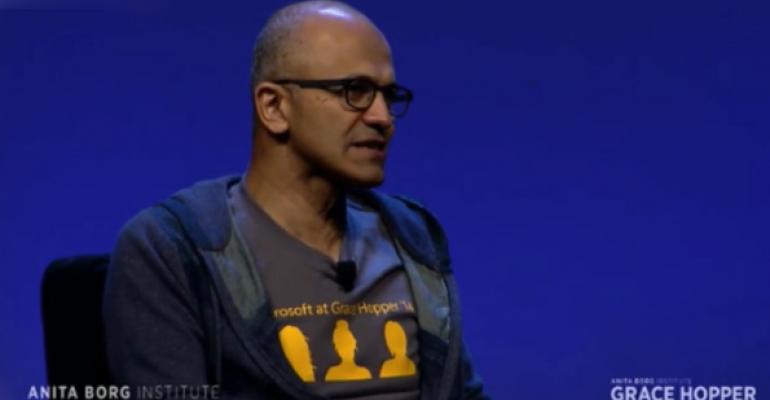It's the verbal equivalent of former US president Gerald R. Ford tripping down the stairs while exiting Air Force One: The normally eloquent Microsoft CEO, Satya Nadella, didn't just come up empty in response to a question during a conference celebrating women in technology last week. He completely blew it.
Reference explanation for the Millennials: President Ford was a celebrated athlete and served in the US Navy during World War II.
Satya Nadella is himself celebrated for both his intelligence and articulate communications skills, and his engineering background and cloud focus makes him an ideal leader for Microsoft during this transitionary period. But the India-born Mr. Nadella is also touted as evidence of a new Microsoft, one that embraces different and diverse cultures.
All of which, naturally, makes his comments at last week's Grace Hopper Celebration of Women in Computing conference perplexing.
During a discussion of pay inequality for women in technology firms, Mr. Nadella was asked what advice he would give to women about asking for a raise. From a Q&A perspective, this question was both of the "softball" variety—something virtually anyone could answer acceptably for the women-filled audience at the show—and something that Nadella was surely pre-briefed on: The CEO of one of the world's most powerful companies doesn't show up randomly at conferences to freewheel, after all.
"It's not really about asking for the raise, but knowing and having faith that the system will actually give you the right raises as you go along," he said, answering the question. "Because that's good karma. It'll come back because somebody's going to know that's the kind of person that I want to trust."
One imagines that the value of Microsoft's shares started plummeting before that last sentence had even concluded. The questioner, Maria Klawe—a computer scientist and president of Harvey Mudd College, not to mention a Microsoft board member—was not amused. "This is one of the very few things I disagree with you on," she finally sputtered.
The blowback was immediate and fierce. Rushing off to another event, Mr. Nadella's Twitter account was updated with a brief statement—"[I] was inarticulate [about] how women should ask for raise. Our industry must close gender pay gap so a raise is not needed because of a bias"—but Microsoft's PR machinery was already in overdrive and eventually helped Nadella publish a more formal apology in the form of a public letter to Microsoft's employees on its web site.
"I believe men and women should get equal pay for equal work," he wrote, stating the obvious. "And when it comes to career advice on getting a raise when you think it's deserved ... If you think you deserve a raise, you should just ask."
The data on inequality in the tech industry is fairly obvious. Women are paid on average only 78 percent of what equally qualified men earn, and they represent a distinct minority in the world's biggest tech companies. Only 29 percent of Microsoft's employees are women, a figure that trails Intel, Hewlett-Packard, LinkedIn, and Yahoo by fairly wide margins. (Google has an identical percentage of female employees.) But that's the firm's worldwide employee base. If you look just at its tech workforce, only 17.1 percent of Microsoft's employees are women. And they make, on average, about $7000 less per year--$124,000 vs. $131,000 for a senior product manager—than their male counterparts at Microsoft.
Oddly enough, Mr. Nadella's Indian cultural values factor into the tortured explanations for his crazy answer to a simple question. Maria Klawe later suggested in an interview with Bloomberg that it was not appropriate in Indian culture to ask for things, and that he would have answered in the same way for a man who feels he isn't being paid enough. "His comments were not about women," she claimed. "Nobody should have to ask [for a raise] because the system should work fairly."
It's worth mentioning too, that Nadella's appearance at the conference—about 40 minutes worth—was mostly hugely positive, and he received several lengthy applauses for his comments about equality and diversity in tech. "The buzz was just incredible," Klawe said, claiming that the reaction to Mr. Nadella's appearance in the outside world was overblown. "It was intensely positive."
The bigger and longer-lasting issue here isn't so much one confusing answer from a normally articulate CEO. It's that Microsoft—like most of the tech industry—still doesn't treat women equally, and certainly not when it comes to pay. Since Mr. Nadella's appearance at the Celebration of Women in Computing conference was designed to draw attention to this fact—he said as much in a previous open letter to employees that referenced his "hope of inspiring talented female engineers to continue pursuing careers in technology ... and further the discussion on women in technology"—one might argue that these goals, ultimately, were met.
Certainly, it will be hard for the software giant to ignore pay inequality going forward. And perhaps Mr. Nadella's public stumble—and the vocal outcry it caused—will inspire other tech firms to do the right thing as well.





